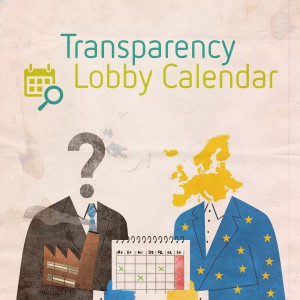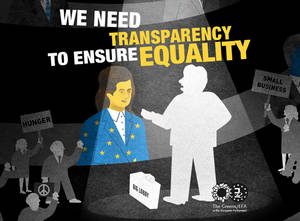
Two years after being elected to the European Parliament and right before the summer break is the perfect time to have a look back at all the lobby meetings I had during the last two years to make sure there was a balance among them.
When I was named rapporteur of the copyright report and lobby meeting requests started flooding my email inbox, I wanted to make sure that I would be getting a balance of input from all different stakeholders. I didn’t want the corporate lobby to speak louder just because they have more resources to reach out to EU politicians. I also wanted to hear authors, civil society, academia and all different kinds of organisations. To track whom I met with and make it transparent to my voters, we created the LobbyCal project, which today is used by many of my colleagues.
So… who did I meet?
As all the data from LobbyCal can easily be downloaded in a machine-readable format and we link entries to the EU’s official Lobby Transparency Register, it is easy to analyse which types of organisations I am meeting with. I classified the 167 meetings (including my assistants’ meetings) by type of organisation according to the Transparency Register:
[visualizer id=”5656″]Enabling such analysis is one important reason that I ask all organisations who want to meet to register with the Transparency Register, even if it is not mandatory today. It doesn’t just contribute to greater transparency within the legislative processes, but also helps both citizens and politicians themselves to track the balance of their meetings.
But transparency alone is not enough to ensure balance. As we can see, there is still a large number of meetings with business interests, simply because they have the resources to follow European legislative processes very closely and be persistent in requesting meetings. This is less the case for many civil society organisations. It is important to be aware of this so I can proactively try to reach a more diverse group of stakeholders.
I also tag my meetings with the main topics we discussed. Here’s a visualisation of these topics, scaled by volume – not surprisingly, copyright was the topic most discussed, followed by the EU’s Digital Single Market (DSM) project.
Why it is important to use LobbyCal
In 2014, the Greens/EFA group defined Transparency and Democracy as one of its priorities for this legislature, which encompassed achieving and advocating for greater lobby transparency. Moreover, many MEPs signed an anti-corruption pledge before being elected committing themselves to be models of transparency, accountability and integrity. Using this tool is one of the easiest ways of making this promise true.
 Since I launched the project together with the Greens/EFA group, 32 of my colleagues have started using it as well. There are MEPs from other political groups who are also interested in starting using it. We welcome this – our aim was always to create a non-partisan tool that everybody can use to be more transparent and accountable. For that reason, we handed management of the project over to Transparency International Europe, who are promoting it as a tool available to everyone. LobbyCal is open source (available on Github here, here and here), and contributions are always welcome. Feel free to adapt it to your needs!
Since I launched the project together with the Greens/EFA group, 32 of my colleagues have started using it as well. There are MEPs from other political groups who are also interested in starting using it. We welcome this – our aim was always to create a non-partisan tool that everybody can use to be more transparent and accountable. For that reason, we handed management of the project over to Transparency International Europe, who are promoting it as a tool available to everyone. LobbyCal is open source (available on Github here, here and here), and contributions are always welcome. Feel free to adapt it to your needs!
How to use LobbyCal
Once the tool is set up, using it is as easy as inviting a virtual LobbyCal participant to all meetings with lobbyists in your calendar software. We refuse to believe that being more transparent needs to incur an additional administrative burden. With the LobbyCal project, I have demonstrated this.
I would like to encourage not only politicians to use LobbyCal, but also NGOs and the public in general to follow up the representative work we do for them in the European Parliament. All the information is available in a machine-readable format. Use it, analyse, compare, play with it… tell us your findings! Empower yourself and participate in the process of building a more transparent and democratic European Union!
To the extent possible under law, the creator has waived all copyright and related or neighboring rights to this work.